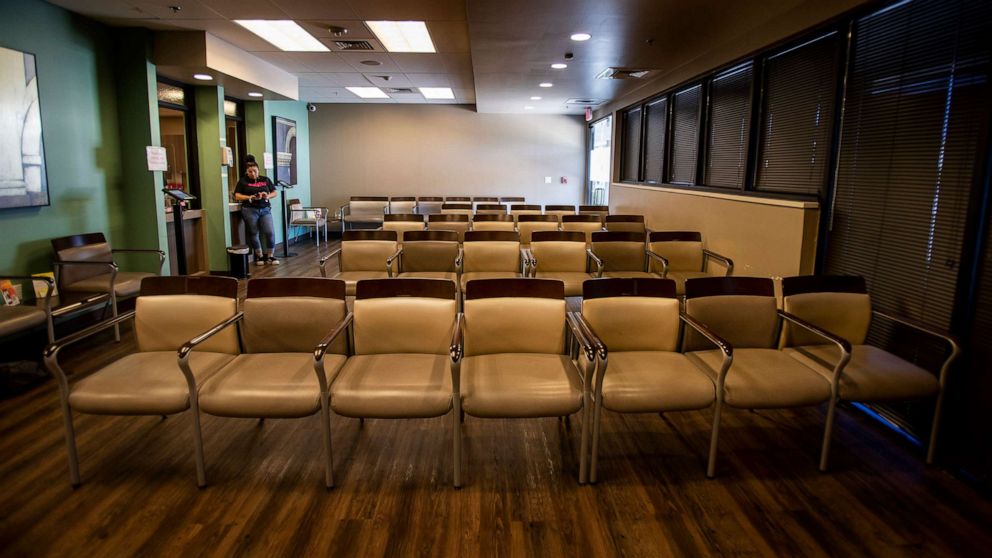[ad_1]
The Supreme Court’s decision to overturn Roe v. Wade and allow states to decide their own stances on abortion access has led 16 states to cease nearly all services. An economic fallout may come next.
Abortion rights advocates have said that the lack of access to reproductive care can lead to poverty or debt and pregnancy can be expensive, according to data from the Centers for Disease Control and Prevention. Abortion restrictions also disproportionately affect women of color, according to research conducted by The Institute For Women’s Policy Research. That study also declared that “currently employed women aged 15 to 44 would gain $101.8 billion in higher earnings annually” if all state-level abortion restrictions were eliminated.
Stanford economist Mark Duggan described two ways that states which have restricted abortion access may feel a negative impact from this decision in a phone call with ABC News. One way is by the direct impact of unintended pregnancies.
Potential Economic Impact of Abortions
Studies, such as one from the National Library of Science, have concluded that women who were denied abortions may face economic hardship that lasts for years. Another study from the U.S. Department of Agriculture calculated that raising a child costs a quarter million dollars, a price tag that can bankrupt people if they are not prepared. Finally, one of the leading studies – The Turnaway Study – found that “being denied an abortion results in worse financial, health and family outcomes.”
“It may really disrupt their economic trajectory in a gigantic way,” Duggan said of people who are turned away from abortion care.
However, there is disagreement with the previously stated studies. Ahead of the Dobbs v. Jackson case that overturned Roe, 240 women published an amicus brief to discredit the negative economic impacts associated with abortion restrictions that many studies have found. The amicus rejected the Turnaway Study and other studies due to bias and scientific flaws and noted that the Turnaway Study and several others are funded in full or in part by pro-choice groups.

The waiting room at Alamo Womens Reproductive Services is empty as just an hour prior the Supreme Court overturned Roe v. Wade shutting down abortion services at Alamo Womens Reproductive Services, June 24, 2022, in San Antonio, Texas.
Los Angeles Times via Getty Images
The Departure of Businesses
The second economic impact that reducing abortions may have on a state is less direct and revolves around businesses potentially becoming less motivated to expand and grow in places where their female employees cannot receive abortion care.
Duggan believes these new restrictions are “going to create a headwind in some states with the most restrictive [abortion] policies economically.”
The economic fallout of abortion restrictions may be compounded by the fact that many of the states that have taken the strictest stance are also the poorest states by many leading metrics. As of this week, Kentucky, Louisiana, South Dakota, Texas, Mississippi, Alabama, Arkansas, Oklahoma and Missouri have what is known as an abortion ban – where abortions are prohibited outside of rare circumstances like potential death to the mother. Of these nine states, six of them are in the top ten for the highest poverty rate among all states. Five out of the nine are in the top ten lowest for rates of higher education attainment. Five of the states make up the top five in teen birth rates with seven of the nine in the top ten. These factors are strains on a state’s economy through lowering taxable incomes and increasing welfare budgets.
The extent to which abortion rights will factor into companies’ decision-making is not clear. Brigham Young University economics professor Mark Showalter emphasized that businesses are focused on profit margins above all else.
“If they have to choose between abortion-restrictive Texas where the business climate is friendlier than abortion-unrestrictive, but business-unfriendly California, it’s not obvious what firms will do,” Showalter wrote in an email to ABC News.
ABC News reached out to all nine states to ask if they are worried about further widening the gap between them and the rest of the country by enacting potentially costly legislation. Texas was the only state that responded.
“The Texas economy is booming,” Gov. Greg Abbott’s press secretary Renae Eze said. “Businesses are relocating to and investing in the Lone Star State at a record pace because we’ve built a framework that allows free enterprise to flourish and hardworking Texans to prosper.”
Texas is an outlier among the other eight states as its wealth takes itself out of most of the above rankings. The Lone Star State has experienced economic success and an influx of businesses moving there to avoid the high costs of states like California. However, the concern for Texas and the other states is not their current status but rather whether the decision to restrict abortions will be costly down the road.













